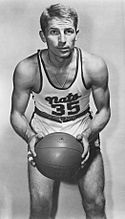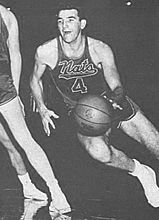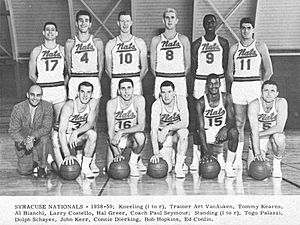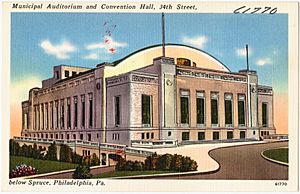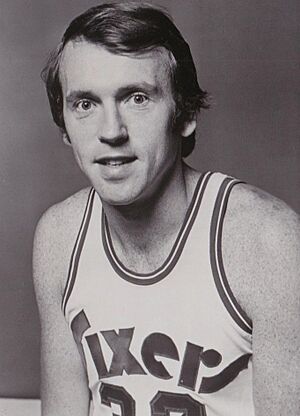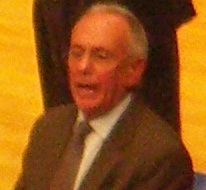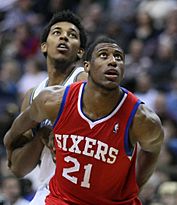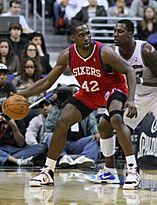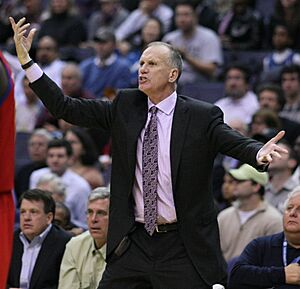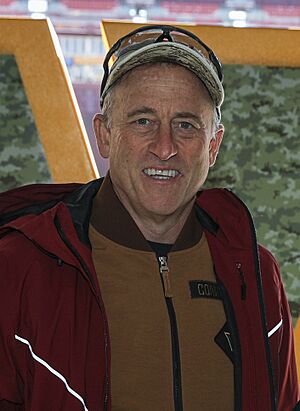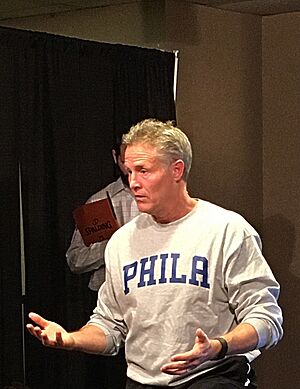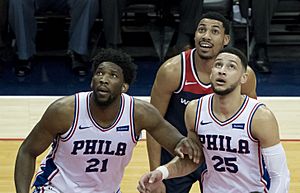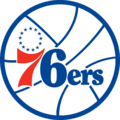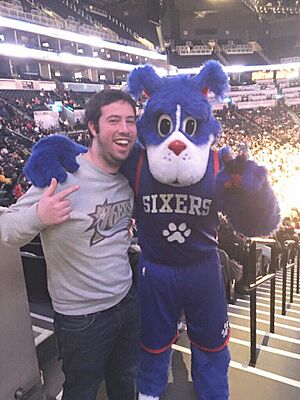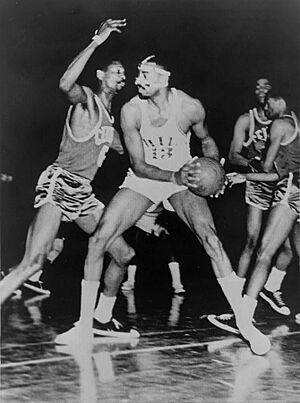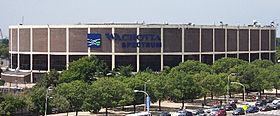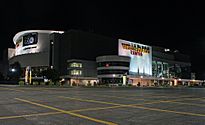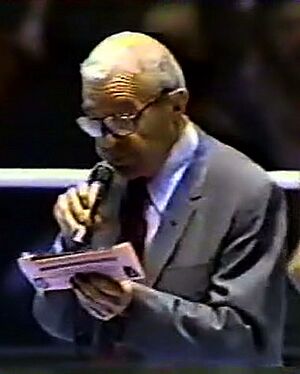Philadelphia 76ers facts for kids
Quick facts for kids Philadelphia 76ers |
|||||
|---|---|---|---|---|---|
| Conference | Eastern | ||||
| Division | Atlantic | ||||
| Founded | 1946 | ||||
| History | Syracuse Nationals 1946–1949 (NBL) 1949–1963 (NBA) Philadelphia 76ers 1963–present |
||||
| Arena | Wells Fargo Center | ||||
| Location | Philadelphia, Pennsylvania | ||||
| Team colors | Blue, red, silver, navy, white |
||||
| Main sponsor | Crypto.com | ||||
| CEO | Tad Brown | ||||
| President | Daryl Morey | ||||
| General manager | Elton Brand | ||||
| Head coach | Nick Nurse | ||||
| Ownership |
|
||||
| Affiliation(s) | Delaware Blue Coats | ||||
| Championships | 3 (1955, 1967, 1983) | ||||
| Conference titles | 5 (1977, 1980, 1982, 1983, 2001) | ||||
| Division titles | 12 (1950, 1952, 1955, 1966, 1967, 1968, 1977, 1978, 1983, 1990, 2001, 2021) | ||||
| Retired numbers | 10 (2, 3, 4, 6, 10, 13, 15, 24, 32, 34) | ||||
|
|||||
The Philadelphia 76ers, often called the Sixers, are a professional basketball team from Philadelphia. They play in the National Basketball Association (NBA) as part of the Eastern Conference's Atlantic Division. Their home games are at the Wells Fargo Center.
The team started in 1946 as the Syracuse Nationals. They are one of the oldest teams in the NBA. Only 8 out of 23 original teams are still around today. Harris Blitzer Sports & Entertainment owns the team. Josh Harris and David Blitzer bought the team in 2011.
Many famous players, including Dolph Schayes, Wilt Chamberlain, Julius Erving, Moses Malone, Charles Barkley, and Allen Iverson, have played for the Sixers. These players are now in the Basketball Hall of Fame.
The 76ers have won three NBA championships. Their first win was in 1955 as the Syracuse Nationals. The second title came in 1967, led by Wilt Chamberlain. The third championship was in 1983, with Julius Erving and Moses Malone as key players. The Sixers reached the NBA Finals again in 2001, led by Allen Iverson, but lost to the Los Angeles Lakers. Several Sixers players have won the NBA Most Valuable Player award, totaling seven MVP awards for the franchise.
Contents
- Team History
- Syracuse Nationals (1946–1963)
- Moving to Philadelphia (1963)
- Wilt Chamberlain Era (1964–1968)
- The Fall of the 76ers (1968–1976)
- Julius Erving Era (1976–1987)
- Charles Barkley Era (1987–1992)
- The Dark Ages (1992–1996)
- Allen Iverson Era (1996–2006)
- Post-Iverson Era (2006–2016)
- Joel Embiid Era (2016–Present)
- Team Look and Uniforms
- Team Mascot
- Team Rivalries
- Season Records
- Team Facilities
- Team Personnel
- Team Records and Honors
- Coaches
- Other Ventures
- See also
Team History
Syracuse Nationals (1946–1963)
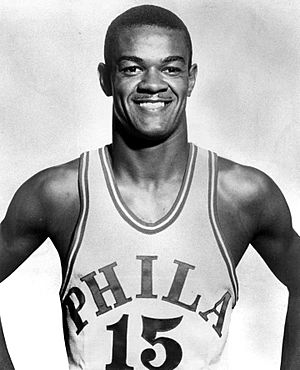
In 1946, Danny Biasone started the Syracuse Nationals in Syracuse, New York. They were part of the National Basketball League (NBL). In their first season, they finished fourth. They lost in the playoffs to the Rochester Royals.
The Nationals improved when Leo Ferris joined. They signed Al Cervi as a player-coach and Dolph Schayes. In 1949, the NBL and BAA merged to form the NBA. The Nationals were one of seven NBL teams to join the NBA.
The Nationals quickly became successful in the NBA. They won the Eastern Division in the 1949–50 season with the best record in the league. They reached the NBA Finals but lost to the Minneapolis Lakers.
In the 1954–55 season, the NBA was struggling. Owner Danny Biasone suggested a 24-second shot clock to make games faster. This idea was a huge success, increasing scoring and excitement. In the first season with the shot clock, the Nationals finished first in the East. They beat the Fort Wayne Pistons in a thrilling seven-game series to win their first NBA Championship. George King made a key free throw and stole the ball to seal the win.
The Nationals continued to be a strong team. They often made the playoffs, even as the last small-town team in the NBA. They faced tough rivals like the Boston Celtics and teams led by stars like Wilt Chamberlain.
Moving to Philadelphia (1963)
After the 1962–63 season, investors Irv Kosloff and Ike Richman bought the Syracuse Nationals. They moved the team to Philadelphia. This filled the gap left by the Warriors, who had moved to San Francisco.
A contest was held to choose a new name. The winning name was the "76ers," honoring the signing of the United States Declaration of Independence in Philadelphia in 1776. The shorter name "Sixers" quickly became popular and is still used today. For their first few years in Philadelphia, the 76ers played at the Philadelphia Arena and Civic Center-Convention Hall.
Wilt Chamberlain Era (1964–1968)
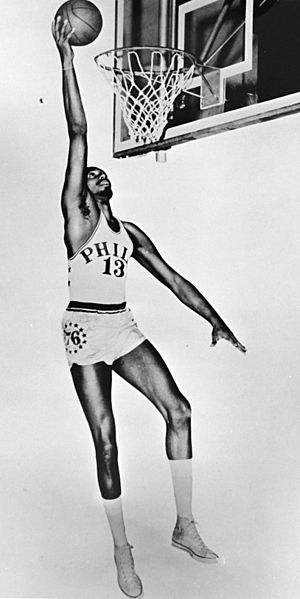
In the 1964–65 season, the 76ers acquired the legendary Wilt Chamberlain. He was a high school star in Philadelphia. The 76ers almost beat the Celtics in the semifinals but lost in Game 7.
First Philadelphia Title (1967)
Under coach Alex Hannum, the 76ers had an amazing 1966–67 season. They started with a 46–4 record and finished 68–13, which was the best record in league history at the time. Chamberlain, Billy Cunningham, and Hal Greer led the team. They finally beat the Celtics in five games in the semifinals. Fans chanted "Boston is dead!" as the Celtics' eight-year championship streak ended. The Sixers then defeated the Warriors in six games to win their second NBA Championship. This 1966–67 team was later voted the best team in league history.
New Home at The Spectrum (1967–1968)
In the 1967–68 season, the 76ers moved to a new home, The Spectrum. They aimed to defend their championship. They reached the NBA Playoffs again and faced the Celtics in the semifinals. The 76ers had a 3–1 series lead but lost to the Celtics in seven games.
The Fall of the 76ers (1968–1976)
After the 1968 season, the 76ers traded Wilt Chamberlain to the Los Angeles Lakers. This trade, along with other player changes, led to a decline in the team's performance. By the 1971–72 season, only five years after winning the title, the 76ers finished with a 30–52 record and missed the playoffs for the first time.
The team hit rock bottom in the 1972–73 season. They lost their first 15 games and set a record with a 20-game losing streak. They finished the season with a terrible 9–73 record. This was the fourth-fewest wins in NBA history for a full season. Many consider this 1972–73 team to be one of the worst in NBA history.
The 76ers slowly started to rebuild. In the 1975–76 season, they acquired George McGinnis and returned to the playoffs.
Julius Erving Era (1976–1987)
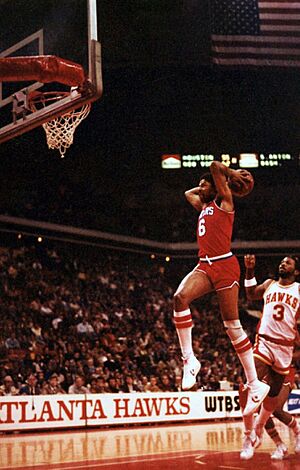
The 76ers made a big comeback in 1976–77. This was largely due to the ABA–NBA merger. The 76ers bought the contract of superstar Julius Erving from the New York Nets. Erving, known as "Dr. J," led the team to the NBA Finals in his first season. They took a 2–0 lead but lost to the Portland Trail Blazers in six games.
The team's motto for the next season was "We owe you one." However, they lost in the conference finals to the Washington Bullets. Over the next few seasons, the 76ers continued to be a strong team but fell short of winning the championship. They lost to the Los Angeles Lakers in the 1980 NBA Finals. In 1981 and 1982, they faced the Celtics in the Eastern Conference Finals. In 1981, they lost after leading 3–1. In 1982, they again led 3–1 and this time won Game 7 in Boston. They then lost to the Lakers in the 1982 Finals.
Third NBA Championship (1983)
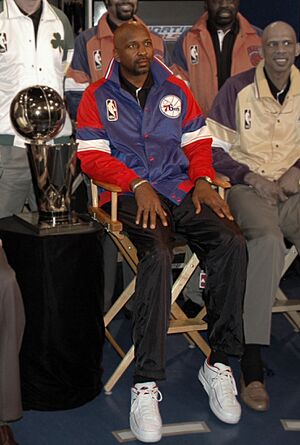
In 1981, Harold Katz bought the 76ers. Before the 1982–83 season, the team added center Moses Malone from the Houston Rockets. With Malone, Erving, Maurice Cheeks, Andrew Toney, and Bobby Jones, the team was dominant. They won 65 games, their second-best season ever. Malone was named League MVP. When asked about the playoffs, he famously predicted "fo', fo', fo'" (four, four, four), meaning they would sweep every series.
The 76ers almost lived up to Malone's prediction. They swept the New York Knicks and beat the Milwaukee Bucks in five games. They then swept the Los Angeles Lakers in the NBA Finals, winning their third NBA championship. Malone was named the Finals MVP. Their playoff record was 12–1, one of the best in league history. This was Philadelphia's last major sports championship until the Phillies won the World Series in 2008.
Charles Barkley Joins the Team
After a disappointing 1983–84 season, Charles Barkley joined the 76ers for the 1984–85 season. For the next eight seasons, Barkley was a fan favorite. The 76ers reached the Eastern Conference Finals in Barkley's rookie year but lost to the Celtics. This was the furthest they would go with Barkley.
In 1986, the team made some controversial trades, sending Moses Malone away. This led to a decline in the team's performance. Julius Erving retired after the 1986–87 season.
Charles Barkley Era (1987–1992)
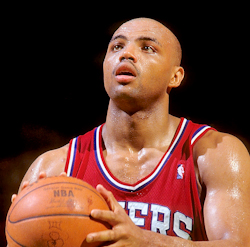
In 1987–88, the 76ers missed the playoffs for the first time in many years. They drafted Hersey Hawkins in 1988, who became a key player. In 1989–90, Barkley finished second in MVP voting. The 76ers won the Atlantic Division title. They beat Cleveland in the first round but lost to Michael Jordan and the Chicago Bulls in the second round. They lost to the Bulls again in 1991. In the 1991–92 season, the 76ers missed the playoffs. In 1992, Barkley was traded to the Phoenix Suns.
The Dark Ages (1992–1996)
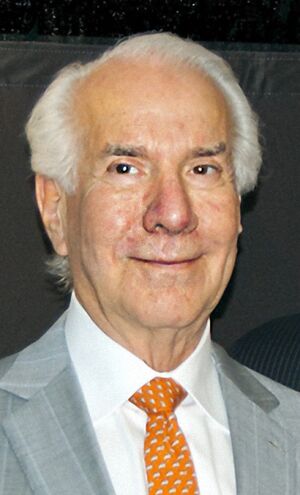
After Barkley left, the 76ers struggled greatly. They had several coaching changes and made poor draft picks. The team's win total decreased every year from 1990–91 to 1995–96. The 1995–96 season was one of the worst in franchise history, with an 18–64 record. Fans called these years "The Dark Ages."
However, there was a bright spot. The team won the lottery for the top pick in the 1996 NBA draft. They used this pick to select Allen Iverson, nicknamed "the Answer."
Allen Iverson Era (1996–2006)
With new ownership, Iverson, and a new arena (the CoreStates Center), things started to look up. The team hired Larry Brown as head coach. Brown was known for his focus on defense. He often disagreed with Iverson, but the team improved. They traded for defensive players like Aaron McKie and Theo Ratliff, and added Eric Snow.
In the lockout-shortened 1998–99 season, the 76ers made the playoffs for the first time since 1991. They upset the Orlando Magic but were swept by the Indiana Pacers. The next season, they improved to 49 wins. They beat the Charlotte Hornets in the first round but again lost to Indiana in the second round.
NBA Finals Appearance (2001)
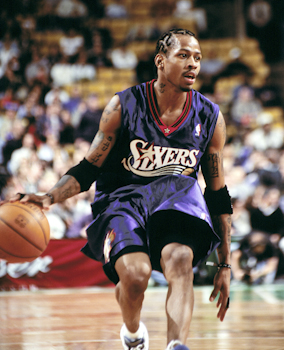
The 2000–01 season was incredible. The 76ers started by winning their first ten games. Larry Brown coached the Eastern Conference All-Stars, and Allen Iverson was the All-Star Game MVP. The team traded for Dikembe Mutombo, a strong defensive center. The 76ers finished with a 56–26 record, winning their division and earning the top seed in the Eastern Conference.
In the playoffs, they beat Indiana and then faced the Toronto Raptors. Iverson scored 54 points in one game and 52 in another. The series went to a thrilling Game 7, which the 76ers won by one point. They then faced the Milwaukee Bucks in the Eastern Conference Finals. After a tough series, the 76ers won Game 7, sending them to the NBA Finals for the first time since 1983.
Their opponent in the Finals was the Los Angeles Lakers, who had not lost a single playoff game yet. In Game 1, the 76ers pulled off a stunning upset, winning in overtime. Iverson famously stepped over Tyronn Lue after a key basket. However, the Lakers won the next four games to win the championship. Despite the loss, the 2000–01 76ers were special. Iverson was the NBA MVP, Brown was Coach of the Year, Mutombo was Defensive Player of the Year, and McKie was Sixth Man of the Year.
After the Finals (2001–2006)
The 76ers had high hopes for the 2001–02 season but finished with a 43–39 record. They lost to the Celtics in the first round of the playoffs. In the 2002–03 season, they started strong and finished 48–34. They beat the New Orleans Hornets in the first round but lost to the Detroit Pistons in a close six-game series.
In 2003, Larry Brown resigned as head coach. The team struggled, missing the playoffs in 2004. In the 2004–05 season, Jim O'Brien became coach. They acquired Chris Webber and drafted Andre Iguodala. The 76ers returned to the playoffs but lost to the Pistons. Maurice Cheeks, a former Sixers player, became head coach in 2005. The team missed the playoffs again in 2006.
In December 2006, Allen Iverson asked to be traded.
Post-Iverson Era (2006–2016)
On December 19, 2006, Allen Iverson was traded to the Denver Nuggets. The team focused on making Andre Iguodala their new leader. They finished the year with a 35–47 record.
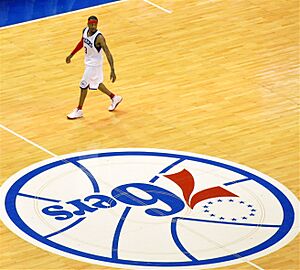
In 2007, the 76ers drafted Thaddeus Young. They made the playoffs in 2008, their first time since 2005. They lost to the Pistons but fans saw it as a successful season. In 2008, the 76ers signed Elton Brand. They also re-signed Lou Williams and Andre Iguodala.
The team fired coach Maurice Cheeks in December 2008. Tony DiLeo took over and the team improved. They made the playoffs but lost to the Orlando Magic. In 2009, Eddie Jordan became the new coach. The 76ers drafted Jrue Holiday. They also brought back their classic 1977–97 logo and new uniforms.
Iverson's Brief Return (2009)
In December 2009, Allen Iverson briefly returned to the 76ers. He played for a few months but left the team in February 2010 due to his daughter's illness. The 76ers finished the season with a 27–55 record. Coach Eddie Jordan was fired.
In May 2010, Doug Collins, a former Sixers player, became head coach. The 76ers drafted Evan Turner with the second overall pick. The team improved significantly in Collins' first season, finishing 41–41 and making the playoffs. They lost to the Miami Heat but Collins was praised for turning the team around.
In 2011, Josh Harris led an investment group that bought the 76ers. The team had a great start to the 2011–12 season. They made the playoffs as the eighth seed and upset the top-seeded Chicago Bulls. This was the fifth time an eighth seed beat a one seed in NBA history. They then faced the Celtics and lost in seven games.
Before the 2012–13 season, the 76ers made a big trade, acquiring Andrew Bynum. However, Bynum suffered knee injuries and never played for the team. Many other players also got injured. The 76ers finished 34–48 and missed the playoffs. Doug Collins resigned as coach in April 2013. Sam Hinkie became the new general manager.
"The Process" Era (2013–2016)
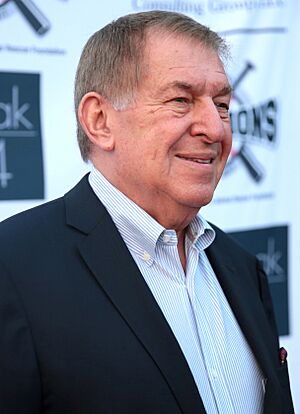
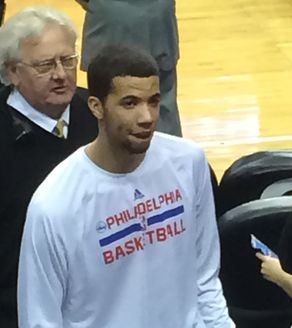
After the 2012–13 season, the 76ers began a major rebuilding plan, often called "The Process." The idea was to gather many draft picks and young talent to build a future championship team. They traded All-Star Jrue Holiday for Nerlens Noel and a future draft pick. Noel was injured and would not play right away. The 76ers drafted Michael Carter-Williams as Holiday's replacement.
The team struggled during this period. In the 2013–14 season, they had a 26-game losing streak, tying an NBA record. They finished 19–63. However, Michael Carter-Williams won the Rookie of the Year award.
In the 2014 NBA draft, the Sixers drafted Joel Embiid and Dario Šarić. Both were injured or playing overseas, so they didn't play immediately. The team continued to trade away experienced players for more draft picks. In the 2014–15 season, they set a franchise record for losses to start a season (0–17) before winning their first game. They finished 18–64.
In 2015, the 76ers drafted Jahlil Okafor. In November 2015, they had a 27-game losing streak that carried over from the previous season, which became the longest losing streak in professional sports. They finished the 2015–16 season with a 10–72 record, one of the worst in NBA history.
Joel Embiid Era (2016–Present)
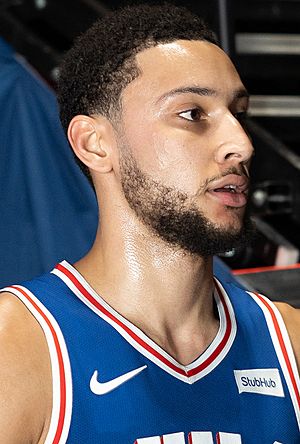
On April 6, 2016, Sam Hinkie resigned. Bryan Colangelo became the new president of basketball operations. The 76ers won the NBA Draft Lottery and earned the first pick in the 2016 NBA draft. They selected Ben Simmons first overall. This was a big moment for "The Process."
Return to Playoffs (2017–2018)
The 2017–18 season was the most successful in years. The team finished third in the Eastern Conference with a 52–30 record. They had a franchise-record 16-game winning streak. In the playoffs, they defeated the Miami Heat in five games, winning their first playoff series since 2012.
Jimmy Butler and Tobias Harris (2018–2019)
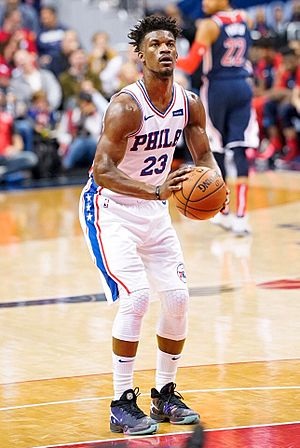
Elton Brand became the new general manager in September 2018. In November 2018, the 76ers traded for Jimmy Butler. In February 2019, they acquired Tobias Harris. The 76ers finished as the third seed. They beat the Brooklyn Nets in the first round of the playoffs. They then faced the Toronto Raptors in the second round. The series went to seven games, and the 76ers lost when Kawhi Leonard made a game-winning shot at the buzzer.
In the off-season, Jimmy Butler left. The team signed Al Horford and acquired Josh Richardson.
Recent Seasons (2020–2024)
The Sixers were expected to be championship contenders in the 2019–20 season. They had a great home record but struggled away from home. The season was paused due to a global event. When it resumed in the NBA Bubble, the Sixers finished sixth in the East. They were swept by the Celtics in the first round of the playoffs. Head coach Brett Brown was fired.
In October 2020, Doc Rivers was hired as the new head coach. Daryl Morey became president of basketball operations. The 76ers finished the 2020–21 season with a 49–23 record, earning the top seed in the Eastern Conference. They beat the Washington Wizards but lost to the Atlanta Hawks in seven games in the Conference Semifinals. Joel Embiid finished second in MVP voting.
After the loss to the Hawks, Ben Simmons asked for a trade and refused to play. On February 10, 2022, the 76ers traded Simmons, Andre Drummond, and Seth Curry to the Brooklyn Nets for James Harden and Paul Millsap. The 2021–22 season ended with a 51–31 record. Embiid won the scoring title. He finished second in MVP voting again.
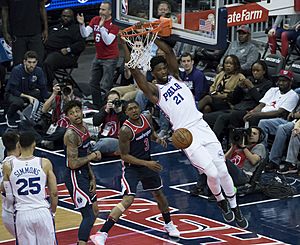
The 2022–23 season was successful. They finished 54–28 as the third seed. They swept the Brooklyn Nets in the first round. However, they lost to the Boston Celtics in seven games in the second round. Despite this, Joel Embiid was named league MVP.
Doc Rivers was fired in May 2023 and replaced by Nick Nurse. The Sixers traded James Harden to the Los Angeles Clippers. The team started the 2023–24 season strong, but Joel Embiid suffered a meniscus injury. He returned on March 5. During his absence, the Sixers fell in the standings. Tyrese Maxey made his first All-Star game. They finished as the seventh seed and won their Play-in game to make the playoffs. They lost to the New York Knicks in the first round.
New Additions (2024–Present)
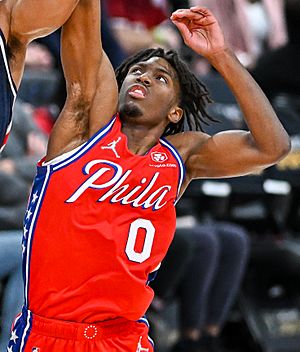
In the 2024 off-season, Paul George signed a four-year contract with the Sixers. They also re-signed Kyle Lowry and acquired Eric Gordon. Tobias Harris signed with the Pistons.
Team Look and Uniforms
The 76ers have changed their logos and uniforms many times over the years.
Early Years (1963–1978)
The first 76ers logo had a red "7" and blue "6" with 13 blue stars above the "7." These stars represented the original 13 American colonies. Their uniforms often featured "PHILA" on the front. They experimented with different designs, including a two-tone look and different fonts for "PHILA" or "Sixers."
Classic Look (1978–1997)
In 1977, the logo was updated to include a basketball. Starting in 1978, the Sixers went back to a simpler uniform design. They wore red road uniforms and white home uniforms, often with "Sixers" written in a block style. Later, they tried more modern designs with waves and different fonts, but eventually returned to a more classic look with thick stripes.
Black, Silver, and Gold Era (1997–2009)
In 1997, the Sixers changed their logo and colors to black, silver, and gold. This was to appeal to a younger, hip-hop-inspired culture. The logo featured "76ers" in gold with a silver star. Their road uniforms were black, and home uniforms were white. They also introduced blue and later red alternate uniforms.
Modern Classic (2009–2015)
In 2009, the team brought back a modern version of their classic 1977–97 logo. The uniforms featured "Sixers" in blue on white jerseys and in white on red jerseys. A blue alternate uniform was added in 2011.
Current Look (2015–Present)
A new version of the classic 76ers logo was revealed for the 2015–16 season. It included a round shape with the city name and stars. A fun new logo, "Dribbling Ben Franklin," was also introduced.
Their current uniforms mix classic styles. The home white and away blue jerseys have "PHILA" on the front, honoring the 1960s teams. The red alternate jerseys say "SIXERS," like the 1980s teams. The sides of the jerseys have seven stars on one side and six on the other, a nod to the 1970s uniforms.
Since 2017, with Nike as the uniform supplier, there have been small changes. The "Icon" (blue) and "Association" (white) uniforms now have a red shadow on the letters. The "Statement" (red) uniform has a script "Sixers" wordmark.
Special Uniforms
The team also has special "City" and "Earned" uniforms each year.
- Their first "City" uniform had fancy "Phila" lettering and was inspired by the United States Declaration of Independence.
- Another "City" uniform was inspired by the 1976 movie Rocky and featured thirteen stars.
- "Earned" uniforms are given to teams that make the playoffs. The Sixers' "Earned" uniforms often use designs from their "City" uniforms but with different colors.
- Recent "City" uniforms have honored the Liberty Bell, the Allen Iverson era, and the Boathouse Row landmark.
- For the NBA's 75th anniversary, the 2021–22 "City" uniforms combined elements from different past designs.
- The 2022–23 "City" uniform focused on Philadelphia's nickname, "City of Brotherly Love."
- The 2023–24 "City" uniform was inspired by neon signs from the Reading Terminal Market.
Team Mascot
Franklin the Dog
On February 10, 2015, Franklin the Dog was introduced as the new Philadelphia 76ers mascot. He made his first appearance at the Wells Fargo Center on February 19, 2015.
Before Franklin, the 76ers had a mascot named Big Shot in the 1980s. He was replaced by Hip Hop, a rabbit known for his slam dunks. Hip Hop did not return after the 2011 NBA lockout.
Team Rivalries
Boston Celtics
The rivalry between the 76ers and the Boston Celtics is the oldest in the NBA. They have played each other in the NBA Playoffs 19 times, with the Celtics winning 12 of those series. It is considered one of the greatest rivalries in the NBA.
The rivalry was intense when Wilt Chamberlain of the Sixers played against Bill Russell of the Celtics from 1965 to 1968. The 1966–67 Sixers team ended Boston's eight-year championship streak.
The rivalry became strong again in the 1980s. Every Eastern Conference Championship between 1980 and 1987 was won by either the 76ers (led by Julius Erving) or the Celtics (led by Larry Bird).
In the 2000s, the rivalry was reborn. The Allen Iverson-led Sixers lost to the Celtics in the 2002 playoffs. Ten years later, in 2012, the Celtics defeated the Sixers in a close seven-game series.
Season Records
Here are the results for the last five seasons the 76ers have completed. For a full history, see List of Philadelphia 76ers seasons.
Note: GP = Games played, W = Wins, L = Losses, W–L% = Winning percentage
| Season | GP | W | L | W–L% | Finish | Playoffs |
| 2020–21 | 72 | 49 | 23 | .681 | 1st, Atlantic | Lost in conference semifinals, 3–4 (Hawks) |
| 2021–22 | 82 | 51 | 31 | .622 | 2nd, Atlantic | Lost in conference semifinals, 2–4 (Heat) |
| 2022–23 | 82 | 54 | 28 | .659 | 2nd, Atlantic | Lost in conference semifinals, 3–4 (Celtics) |
| 2023–24 | 82 | 47 | 35 | .573 | 3rd, Atlantic | Lost in first round, 2–4 (Knicks) |
| 2024–25 | 82 | 24 | 58 | .293 | 5th, Atlantic | Did not qualify |
Team Facilities
Home Arenas
The 76ers have played in several home arenas:
- State Fair Coliseum (1946–1951)
- Onondaga County War Memorial (1951–1963)
- Convention Hall and Philadelphia Arena (1963–1967)
- The Spectrum (1967–1996)
- Wells Fargo Center (1996–present)
Training Facility
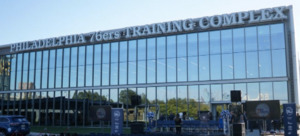
The 76ers' training facility and main office are located at the Philadelphia 76ers Training Complex in Camden, New Jersey. This complex opened in September 2016. Before this, the team practiced at the Philadelphia College of Osteopathic Medicine.
Future Arena Plans
In July 2022, the 76ers announced plans for a new arena in Center City, Philadelphia called 76 Place. However, in January 2025, the team's owners and the owners of the Philadelphia Flyers agreed to build a new arena together. This new arena will be located in the South Philadelphia Sports Complex and is planned to open in 2031.
Team Personnel
Current Roster
Team Records and Honors
Retired Numbers
The 76ers honor important players and staff by retiring their jersey numbers. These numbers are displayed in the rafters at Wells Fargo Center.
| Philadelphia 76ers Retired Numbers and Honorees | ||||
| No. | Player | Position | Years Played | Date Retired |
|---|---|---|---|---|
| 2 | Moses Malone | C | 1982–1986, 1993–1994 | February 8, 2019 |
| 3 | Allen Iverson | G | 1996–2006, 2009–2010 | March 1, 2014 |
| 4 | Dolph Schayes | F/C | 1948–1964 | March 12, 2016 |
| 6 | Julius Erving | F | 1976–1987 | April 18, 1988 |
| 10 | Maurice Cheeks | G | 1978–1989 | February 6, 1995 |
| 13 | Wilt Chamberlain | C | 1965–1968 | March 18, 1991 |
| 15 | Hal Greer | G | 1958–1973 | November 19, 1976 |
| 24 | Bobby Jones | F | 1978–1986 | November 7, 1986 |
| 32 | Billy Cunningham | F | 1965–1972, 1974–1976 | December 17, 1976 |
| 34 | Charles Barkley | F | 1984–1992 | March 30, 2001 |
| Dave Zinkoff | Public-address announcer |
1963–1985 | March 25, 1986 | |
Basketball Hall of Famers
Many players and coaches who were part of the Philadelphia 76ers have been inducted into the Basketball Hall of Fame.
| Philadelphia 76ers Basketball Hall of Famers | |||||||||
|---|---|---|---|---|---|---|---|---|---|
| Players | |||||||||
| No. | Name | Position | Years Played | Inducted | No. | Name | Position | Years Played | Inducted |
| 4 8 55 |
Dolph Schayes | F/C | 1948–1964 | 1973 | 13 | Wilt Chamberlain | C | 1965–1968 | 1979 |
| 15 | Hal Greer | G/F | 1958–1973 | 1982 | 15 | Al Cervi | F/G | 1948–1953 | 1985 |
| 32 | Billy Cunningham | F/C | 1965–1972 1974–1976 |
1986 | 6 | Julius Erving | F | 1976–1987 | 1993 |
| 12 | George Yardley | F/G | 1959–1960 | 1996 | 16 | Bailey Howell | F/G | 1970–1971 | 1997 |
| 11 | Bob McAdoo | F/C | 1986 | 2000 | 2 | Moses Malone | C/F | 1982–1986 1993–1994 |
2001 |
| 32 34 |
Charles Barkley | F/G | 1984–1992 | 2006 | 25 | Chet Walker | F | 1962–1969 | 2012 |
| 55 | Dikembe Mutombo | C | 2001–2002 | 2015 | 3 | Allen Iverson | G | 1996–2006 2009–2010 |
2016 |
| 30 | George McGinnis | F | 1975–1978 | 2017 | 10 | Maurice Cheeks | G | 1978–1989 | 2018 |
| 24 | Bobby Jones | F | 1978–1986 | 2019 | 7 | Toni Kukoč | F | 2000–2001 | 2021 |
| 4 | Chris Webber | F | 2005–2007 | 2021 | 5 | Dick Barnett | G | 1959–1961 | 2024 |
| Coaches | |||||||||
| Name | Position | Years Coached | Inducted | Name | Position | Years Coached | Inducted | ||
| Jack Ramsay | Head coach | 1968–1972 | 1992 | Chuck Daly | Assistant coach | 1978–1981 | 1994 | ||
| 10 | Alex Hannum | Head coach | 1960–1963 1966–1968 |
1998 | Larry Brown | Head coach | 1997–2003 | 2002 | |
| John Calipari | Assistant coach | 1999–2000 | 2015 | ||||||
| Contributors | |||||||||
| Name | Position | Years with Team | Inducted | Name | Position | Years with Team | Inducted | ||
| Danny Biasone | Founder Owner |
1946–1963 | 2000 | 8 11 |
Earl Lloyd | F | 1952–1958 | 2003 | |
| Jerry Colangelo | Executive | 2015–2016 | 2004 | Rod Thorn | President | 2010–2013 | 2018 | ||
| 6 15 21 |
Larry Costello | G | 1957–1965 1966–68 |
2022 | 20 | Doug Collins | Head coach | 2010–2013 | 2024 |
Coaches
Other Ventures
Esports Teams
In September 2016, the 76ers became the first North American professional sports team to own an esports team. They bought Team Dignitas and Apex Gaming and combined them under the Dignitas name.
See also
 In Spanish: Philadelphia 76ers para niños
In Spanish: Philadelphia 76ers para niños
- South Philadelphia Sports Complex
- Sports in Philadelphia


